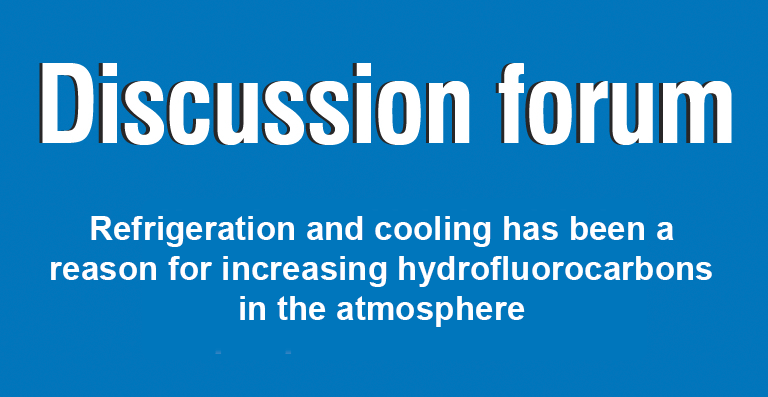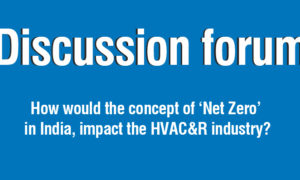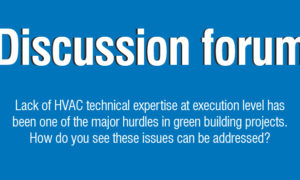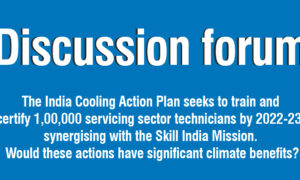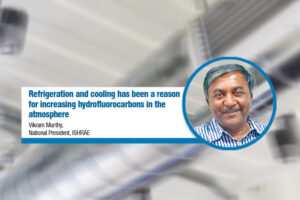 I view this with a great degree of positiveness. Hydrocarbon refrigerants will come under the category of mildly flammable or flammable. All standards of safety and installation will ensure their reliability and safe operation. ISHRAE will be supervising or undertaking the testing of such refrigerants and writing guidelines and standards in cooperation with all stakeholders. The biggest benefit will be Zero GWP. Our country has committed to phase down existing HFCs that cause global warming. In addition ISHRAE strongly supports the development and testing of natural refrigerants Ammonia and carbon dioxide. These refrigerants are zero GWP too and will be very cost effective for India. So we in ISHRAE support the early transition to hydrocarbon and natural refrigerants primarily because these are the alternatives to reach zero GWP as per our committed Government national plan of action under ICAP, the India Cooling Action Plan by the MoEFCC.
I view this with a great degree of positiveness. Hydrocarbon refrigerants will come under the category of mildly flammable or flammable. All standards of safety and installation will ensure their reliability and safe operation. ISHRAE will be supervising or undertaking the testing of such refrigerants and writing guidelines and standards in cooperation with all stakeholders. The biggest benefit will be Zero GWP. Our country has committed to phase down existing HFCs that cause global warming. In addition ISHRAE strongly supports the development and testing of natural refrigerants Ammonia and carbon dioxide. These refrigerants are zero GWP too and will be very cost effective for India. So we in ISHRAE support the early transition to hydrocarbon and natural refrigerants primarily because these are the alternatives to reach zero GWP as per our committed Government national plan of action under ICAP, the India Cooling Action Plan by the MoEFCC.
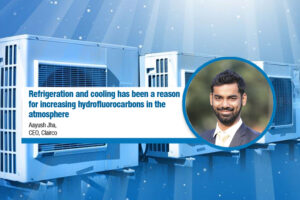 On an average, 75-80 percent of electricity consumption in a building is because of HVAC; that’s a lot of energy being consumed by one particular category, heating cooling or ventilation. This is not a smart move for the OEMs as well as for buildings; be it in India or any other developing countries. There are a lot of energy efficiency companies in the world that have come up with sensor based technologies which is completely data driven to reduce power consumption by 40 per cent. There is high need for property owners and building owners to use these kinds of energy efficient technologies. Till that happens HVAC will continue consuming power on a large scale. HVAC OEMs should start licensing or buy from such technology providers and inculcate that technology in their own air-conditioning system. I think this alignment needs to be done and not that difficult and in my opinion will happen gradually in a shorter span of time. Maybe in the next 5 years, companies will start using these data driven sensor technologies to make their HVAC systems much more efficient.
On an average, 75-80 percent of electricity consumption in a building is because of HVAC; that’s a lot of energy being consumed by one particular category, heating cooling or ventilation. This is not a smart move for the OEMs as well as for buildings; be it in India or any other developing countries. There are a lot of energy efficiency companies in the world that have come up with sensor based technologies which is completely data driven to reduce power consumption by 40 per cent. There is high need for property owners and building owners to use these kinds of energy efficient technologies. Till that happens HVAC will continue consuming power on a large scale. HVAC OEMs should start licensing or buy from such technology providers and inculcate that technology in their own air-conditioning system. I think this alignment needs to be done and not that difficult and in my opinion will happen gradually in a shorter span of time. Maybe in the next 5 years, companies will start using these data driven sensor technologies to make their HVAC systems much more efficient.
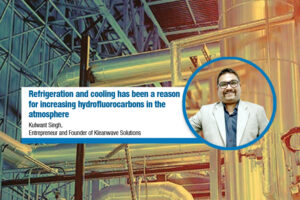
HVAC is no longer a luxury, it is one of the basic necessity of life. The HVAC market will continue to expand although its impact on environment is huge, despite adopting various energy efficient systems still the issue is not resolved and need to be addressed on an on-going basis.
We are now dependent on this market for medical to agricultural needs. More than 90 per cent of refrigeration equipment relies on vapour compression using refrigerants and this figure will not change in the near future: other technologies do not generally have enough efficiency. Chlorinated CFCs, HCFCs and HFCs contribute to the depletion of stratospheric ozone if released into the atmosphere due to equipment leaks or if refrigerants are not properly recovered when disposal of the equipment takes place. Current measurements of the ozone layer show overall stability and probable recovery to the previous level around 2060. They are often replaced by hydro fluorocarbons (HFCs) which do not deplete the ozone layer but are potent greenhouse gases, as are HCFCs, when released into the atmosphere. CFCs were also greenhouse gases and their global warming potential was much higher.
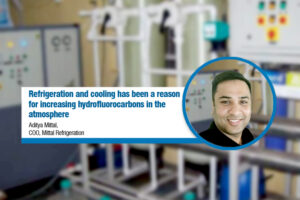 Yes! As per my knowledge and thinking, HVAC industry is a major contributor to ozone depletion and global warming. New and alternative environment friendly refrigerants are coming to the market. At this moment, the basic principle of air conditioning and refrigeration cycle remains the same even in developed countries such as US, Europe, Japan. A totally new technology bypassing the air conditioning cycle has not yet happened. But yes, new alternative refrigerants have come out. When you charge these refrigerants in your air-conditioners, even if these refrigerants go out in the atmosphere they cause much less harm to our climate, almost negligible than the ones which are currently used. The customer awareness is not much. As a buyer, nobody thinks about the climate before buying an air conditioner whether they should go for an air-conditioner with a new refrigerant or whether the new and latest air-conditioner will cause no harm to the environment.
Yes! As per my knowledge and thinking, HVAC industry is a major contributor to ozone depletion and global warming. New and alternative environment friendly refrigerants are coming to the market. At this moment, the basic principle of air conditioning and refrigeration cycle remains the same even in developed countries such as US, Europe, Japan. A totally new technology bypassing the air conditioning cycle has not yet happened. But yes, new alternative refrigerants have come out. When you charge these refrigerants in your air-conditioners, even if these refrigerants go out in the atmosphere they cause much less harm to our climate, almost negligible than the ones which are currently used. The customer awareness is not much. As a buyer, nobody thinks about the climate before buying an air conditioner whether they should go for an air-conditioner with a new refrigerant or whether the new and latest air-conditioner will cause no harm to the environment.
 As the consumers demand changes, there will be an increase in HFC, but that can be offset by other sources of input energy. India being a predominantly coal driven energy generation economy can help reduce the footprint by opting for wind, electric and hydro energy which can lower the environmental impact on generation. The figure of 19 percent carbon emission in 2050 is based upon the technology that exists today. I am sure that the technology in puff panels and refrigeration equipment will improve in the years to come which will have a lower impact.
As the consumers demand changes, there will be an increase in HFC, but that can be offset by other sources of input energy. India being a predominantly coal driven energy generation economy can help reduce the footprint by opting for wind, electric and hydro energy which can lower the environmental impact on generation. The figure of 19 percent carbon emission in 2050 is based upon the technology that exists today. I am sure that the technology in puff panels and refrigeration equipment will improve in the years to come which will have a lower impact.
Cookie Consent
We use cookies to personalize your experience. By continuing to visit this website you agree to our Terms & Conditions, Privacy Policy and Cookie Policy.

